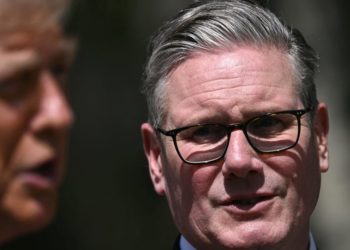When Senator Bernie Sanders took his “Fighting Oligarchy” tour to Missoula, Montana, in mid-April, he had one person in particular on his mind. “Mr. Musk himself owns more wealth than the bottom 56 percent of American households,” he said. “That is not what this country is supposed to be about.” But it is, he emphasized, what Republicans in Congress are about. “It is not good enough for them that Musk owns more wealth than the bottom 56 percent of households. Not good enough for them that the top 1 percent owns more wealth than the bottom 90 percent,” Sanders said. “So now they’re working on legislation that would provide $1.1 trillion in tax breaks to the 1 percent.” With his typical gruff brio, he called on Americans to fight back: “We’re not going to give Musk and his billionaire friends a tax break. We’re going to demand they start paying their fair share of taxes.”
Some political observers have been surprised by Sanders’s recent record-breaking crowds, which give credence to his claim that not only progressives, but independents and even Republicans, are being energized by his message. But if you look at the results of a new poll commissioned by The New Republic, it’s not so surprising at all. The survey of 958 registered voters, conducted April 9–14 by Embold Research, found broad frustration with how wealth is distributed in America, specifically the extreme concentration of wealth among the superrich. It suggests that most Americans—even a startling number of Republicans—agree with pretty much everything Sanders said. If the poll can be summarized in one sentence, it’s this: Americans have a solid grasp of the highly unequal concentration of wealth in the United States—and they think it’s rotten.

TNR’s poll asked voters about economic inequality in America, specifically their view of how the middle class and the rich have done over the last 40 years. A resounding 78 percent of respondents said the rich have gained “much more” than the middle class, and another 10 percent said, “a little more.” The former answer is closer to the truth: Since the 1970s, upper-class income has grown at a significantly higher pace than middle-class income. And voters aren’t happy about it: Nearly three in four poll respondents said that “the rich have too much”; even 48 percent of Republicans felt this way. Given that sentiment, it stands to reason that people also overwhelmingly believe that the rich aren’t taxed nearly enough: Two-thirds overall, including 43 percent of Republicans, said that the top 0.1 percent pay “too little” in taxes—and they felt roughly the same about the top 1 percent. A majority, 56 percent, also said that the top 10 percent aren’t being taxed enough. Conversely, 64 percent of all respondents—and even 54 percent of Republicans—believe that the bottom 50 percent of Americans pay “too much” in taxes.
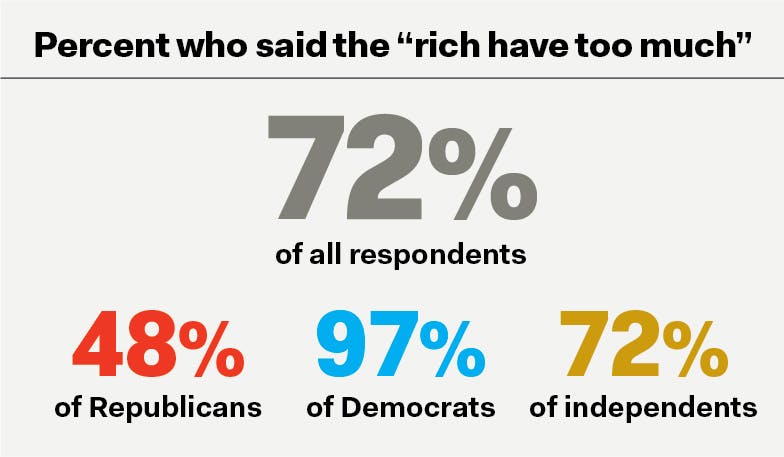
From a Democratic perspective, those are perhaps the poll’s most optimistic findings, showing broad agreement among Americans that the rich should be taxed more and lower-income people should be taxed less. These views explain why politicians who adopt this position and hammer it on the stump, like Sanders and Representative Alexandria Ocasio-Cortez, have amassed huge followings. The findings also make one wonder why more elected Democrats—most of whom do want to increase taxes on the rich and reduce financial burdens on working-class and poor people—aren’t following Sanders’s lead rhetorically, given how unequivocal the polling results are.
Now, the bad news for Democrats: They don’t get nearly enough credit for superior stewardship of the economy. We asked voters which party, in general, “does a better job of handling the economy.” It was a statistical tie: 45 percent said Democrats, 44 percent Republicans; the rest were unsure. (The poll’s margin of error was 3.6 percent.) On its own, this result might not be so dispiriting, given that for the past decade or so Republicans have been seen—contra reality—as more trustworthy on the economy. But consider that we asked voters this question mere days after Trump’s so-called Liberation Day, when he tanked the markets by declaring a 10 percent tariff on almost all countries and a 145 percent tariff on China (with a few exceptions). Why didn’t we see a bigger gap here between Democrats and Republicans?
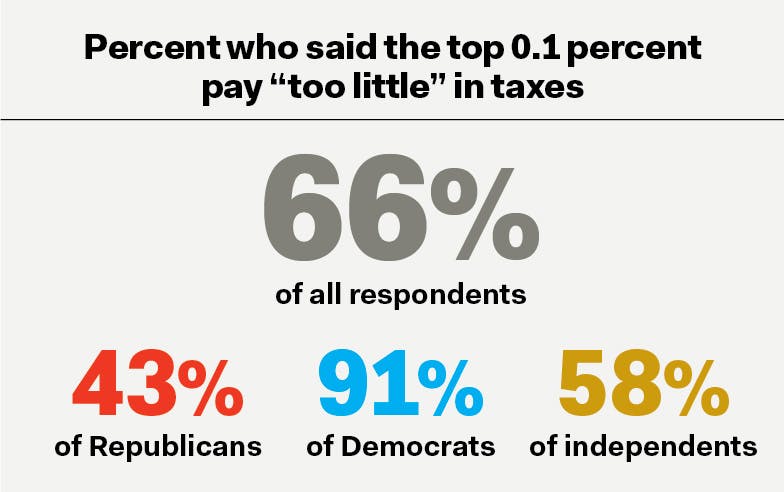
“I think at this point people are not really feeling the impact on their pocketbooks of the tariffs,” said Bharati Ganesh, an analyst at Embold Research. The data, which is continually evolving, suggests that Trump’s supporters “are going to give him the benefit of the doubt on that, and I don’t think they’ve fully made up their minds as to whether or not the slew of tariffs … affects them in a financially negative way.”
Moreover, and frustratingly, Democrats do measurably outperform Republicans on specific economic metrics. Our poll asked voters to consider the years 1988–2020, when the Democratic Party and the Republican Party each controlled the White House for 16 years: “During the entire 32-year period, under which political party’s presidents do you think: more jobs were created; the American economy grew more; the average family income increased more; the stock market performed better.” There is only one right answer to all of these questions—and a plurality of the poll’s respondents, to their credit, responded correctly, choosing the Democratic presidents over the Republicans by margins ranging from 7 to 9 points. But given this (accurate) perception, why didn’t the Democrats outperform Republicans on the general question of their handling of the economy?
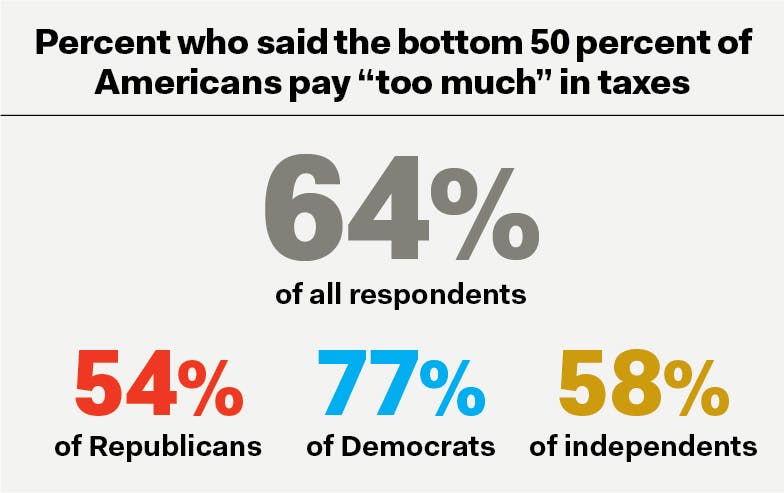
One theory put forth by Ganesh is that because the question related to 1988–2020, it wasn’t “accounting for Biden’s term, where we saw high levels of dissatisfaction on economic conditions like inflation.” (TNR chose that time frame so as to have a like-for-like comparison of Republican and Democratic rule for 16 years each.) Had the Biden years been included, she said, the responses “would have been worse” for Democrats, “especially on metrics related to family income.” She noted “the disconnect that people were perceiving when you had an administration that was talking a lot about jobs, job creation, but people not necessarily feeling that material growth in wages.”
The goal of our poll was not merely to gauge voter sentiment on wealth and the economy, but to test respondents’ knowledge as well. And we were pleasantly surprised by the results. Voters are perhaps more informed than the media often gives them credit for.

For instance, we noted in the poll that one out of every 1,000 American families—the top 0.1 percent—are worth over $60 million on average, then asked voters how much of the total wealth in America (financial assets, real estate, businesses, etc.) they thought was owned by this group. Sixty-two percent correctly chose 12 percent—the highest percentage offered in the poll. Similarly, when asked about the top 1 percent, who on average are worth over $13.5 million each, a plurality of 48 percent correctly chose 31 percent—also the highest percentage among the answers.
This reflects pessimism “about the state of wealth in this country generally,” Ganesh said. She cited the influence of political discourse about “the 1 percent,” as well as the simple fact that Americans “really feel pinched” in today’s economy. “I think this is a product of what they’re hearing in the media, as well as what they’re hearing elected officials [and] politicians say,” she said, “as well as their lived experiences and what they are feeling on a day-to-day basis, where things just keep getting more and more expensive and they’re just getting squeezed on all sides, no matter how much money they have.”
The respondents also showed a firm grasp of the bottom 50 percent’s wealth, with 43 percent of respondents correctly answering that this group owns just 2 percent of total wealth in America. As for how much wealth these various income groups should own, there’s a broad agreement that the superrich’s share should be much smaller: 40 percent of respondents said the top 0.1 percent should only own less than 10 percent of the total wealth in America, and 35 percent said the same about the top 1 percent. Meanwhile, 40 percent of voters believe the bottom 50 percent should own half or more of the wealth in the country.
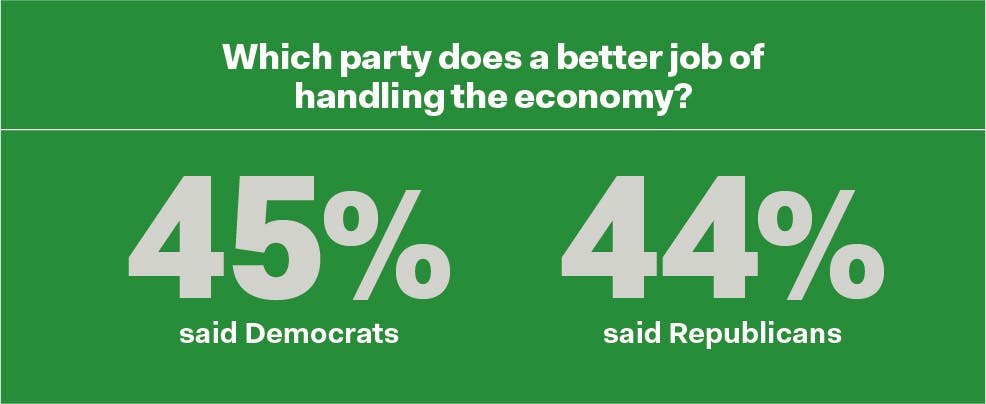
The demographic breakdown on these questions is revealing, particularly when it comes to partisan affiliation: 56 percent of Republicans think the top 0.1 percent should own 20 percent or more of all wealth in the United States; 25 percent of them think the top 0.1 percent should own 40 percent or more. As for the top 1 percent, one in five Republicans think the group should own 50 percent or more of total wealth. In short, a lot of Republicans—even in this allegedly populist MAGA era—still believe that the rich should be allowed to accrue as much wealth as they please. Among Democrats, 54 percent of respondents said the top 0.1 percent should own less than 10 percent of the total wealth, while 47 percent said the same about the top 1 percent. These numbers roughly invert when it pertains to the bottom 50 percent, which 49 percent of Democrats think should own 50 percent or more of total wealth, versus just 28 percent of Republicans. This is consistent with other polls that show Democrats are more concerned about income inequality than Republicans are. But here’s an interesting twist from our poll: Independents proved even more distributionist than Democrats on this question, with 53 percent saying the bottom 50 percent should own 50 percent or more of total wealth.
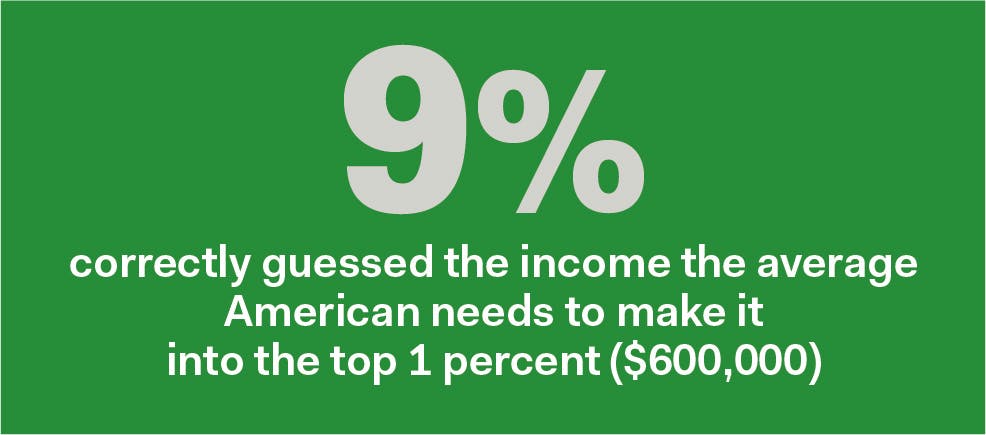
Voters are on less steady ground when asked about the top 10 percent. Though 68 percent of respondents correctly guessed that the average American needs around $200,000 to make it into this group, only 31 percent rightly responded that the top 10 percent owns 36 percent of all wealth. Similarly, they disagree over how much wealth this group should own, as 63 percent answered somewhere between 10 and 30 percent. Meanwhile, respondents overestimated how much money the average American would need to earn to make it into the top 1 percent, with 55 percent choosing around $800,000; only 9 percent guessed the correct answer of $600,000.
Ganesh noted that, in contrast to voters’ responses about the top 0.1 percent and the 1 percent, they were more ambivalent about the 10 percent. “A lot of the focus when it comes to income inequality is really the people at the very top, the superrich, whereas the top 10 percent are a little harder for people to conceptualize. Somebody who’s worth over two million, it could be your next-door neighbor who is a small-business owner.”
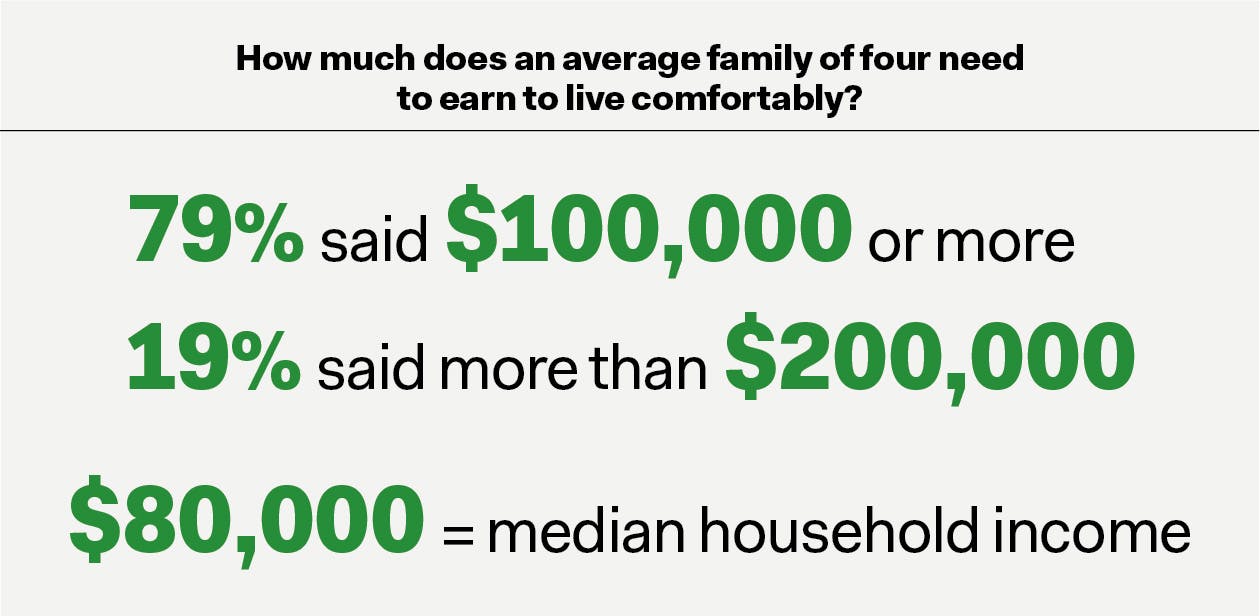
What’s clear, though, is that voters feel economically squeezed. Asked how much an average family of four needs to earn per year to live comfortably, 79 percent said $100,000 or more—and 19 percent said more than $200,000. Given that, according to the most recent U.S. Census data, the median household income in America is $80,000, this tells us that many if not most voters do not feel that they’re living comfortably.
As for the people living more comfortably than anyone else, nearly three in four respondents rightly answered that Elon Musk—not Jeff Bezos or Mark Zuckerberg or George Soros—is the richest person in the world. At the time of the poll, Musk was worth around $300 billion; 25 percent of those polled got that right, whereas 61 percent guessed that he’s worth $400 billion—less than he’s worth today. To be fair, Musk’s wealth fluctuates wildly due to market fluctuations; it recently jumped $18 billion in a single day, due to a rally in Tesla stock. As of May 28, Forbes’s real-time estimate of Musk’s net worth was $431 billion.
So what’s the political takeaway from these poll results? They suggest that Bernie Sanders is on the right track in criticizing the superrich in particular—the top 1 percent as opposed to the top 10 percent.
So what’s the political takeaway from these poll results? They suggest that Sanders is on the right track in criticizing the superrich in particular—the top 1 percent as opposed to the top 10 percent. Americans have a firmer grasp of the former group, and anyway it’s strategically wiser to align with the 99 percent rather than the 90 percent (you’re appealing to more voters that way). Voters overwhelmingly feel that this group has gained way more than everyone else, owns too much of the wealth in America, and isn’t taxed enough. This poll confirms what many on the left have been saying for years. If Democrats are looking for one clear and simple message that’s broadly popular, they should consider this: Soak the rich.
The post The TNR Wealth Poll: Americans Say Spread the Dough appeared first on New Republic.



